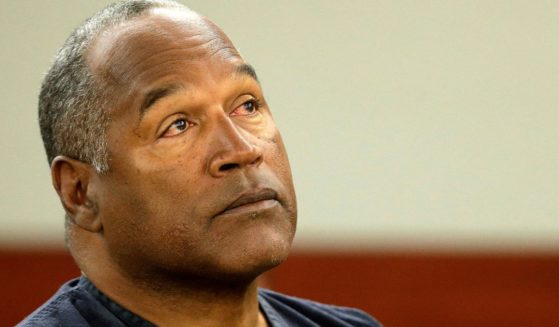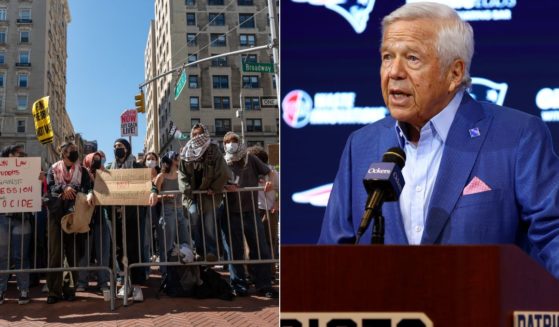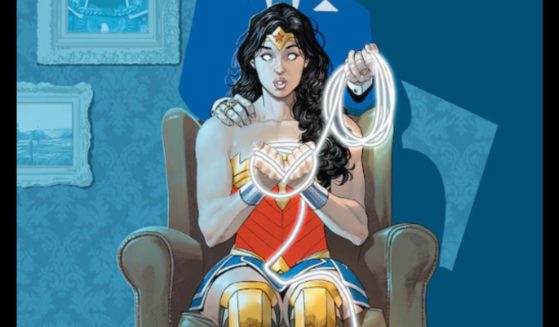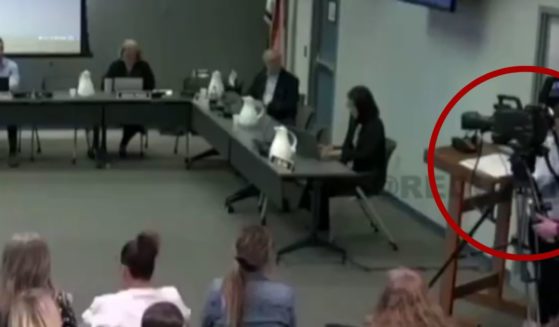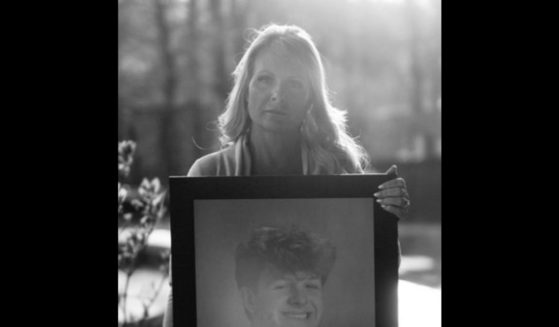Christopher Scalia Reveals His Late Father's Thoughts on RBG
For those unfamiliar with the lives of the two individuals, it sounds like the setup for an outlandish, high-concept Hollywood historical comedy filmed a decade or so from now.
Years before their deaths trigger nomination and confirmation crises in two consecutive presidential races, Supreme Court Justices Antonin Scalia and Ruth Bader Ginsburg find themselves in India. Scalia is played by Seth MacFarlane in a fat suit and RBG by, oh, Tina Fey. The two lose their baggage and all of their identification at the airport in Mumbai — and then they’re framed for a plot to overthrow the Indian government.
The two steal a jitney outside the airport. At first, they can’t stand each other but — and you’ll never believe this happens in a road trip movie — they grow to respect each other’s judicial philosophies and legal minds. On the way to New Delhi, they realize they’re part of a plot to replace the Supreme Court of India with androids. They use their legal acumen to thwart the plot and receive the nation’s highest honor. They celebrate the only way they know how: They ride an elephant.
Not as much of that is the part of a NyQuil fever dream as you might have imagined.
Granted, most of it is. However, those familiar with the history between the two judges know that if you eliminate everything between “Years before their deaths trigger nomination and confirmation crises in two consecutive presidential races, Supreme Court Justices Antonin Scalia and Ruth Bader Ginsburg find themselves in India” and “They ride an elephant,” you actually have a thing that happened:
Justices Antonin Scalia and Ruth Ginsburg riding a elephant in India in 1994 pic.twitter.com/FOu03GTL3r
— Charlie Spiering (@charliespiering) September 18, 2020
The thing is that on the Supreme Court, where personalities aren’t pitted against each other to gain power as they are in electoral politics, friendships develop. In the case of Ginsburg and Scalia, that friendship was especially close — a fact many found shocking, given how far apart the two were in terms of their judicial philosophies.
In the aftermath of Ginsburg’s death, Scalia’s son Christopher took to Twitter to share some of his family’s memories of the Supreme Court justice.
“I’m very sad to hear about the passing of my parents’ good friend, and my father’s wonderful colleague, Justice Ginsburg. May her memory be a blessing. I’d like to share a couple of passages that convey what she meant to my dad,” Christopher Scalia, now with the American Enterprise Institute, tweeted.
I’m very sad to hear about the passing of my parents’ good friend, and my father’s wonderful colleague, Justice Ginsburg. May her memory be a blessing. I’d like to share a couple of passages that convey what she meant to my dad…/3
— Christopher J. Scalia (@cjscalia) September 18, 2020
Both Scalia and Ginsburg were judges on the D.C. Circuit Court of Appeals — in constitutional law, the most powerful judicial body besides the Supreme Court. Scalia got called up to the top court first under Ronald Reagan, in 1986. Ginsburg would get confirmed in 1993 under Bill Clinton.
Three years before her confirmation, however, Scalia appeared at a roast honoring Ginsburg’s 10th anniversary on the D.C. Circuit Court. At the end of his routine, which I’m assuming was a bit less cutting than stand-up comedy’s general fare and with a few more jurisprudence jokes, he had a few heartfelt remarks to share about his then-former colleague.
“I have missed Ruth very much since leaving the court of appeals,” Scalia said. “She was the best of colleagues, as she is the best of friends. I wish her a hundred years.”
This is from a roast he delivered for her 10th anniversary on the DC Circuit Court of Appeals. They’d been colleagues on that court until he went to the Supreme Court; she hadn’t joined him there yet—and he missed her. pic.twitter.com/rrgFfNlvJL
— Christopher J. Scalia (@cjscalia) September 19, 2020
Another story came from Jeffrey Sutton. Sutton — a federal appeals court judge and a former law clerk with Scalia, according to The Hill — talked about spending time with Scalia toward the end of the justice’s life.
“As I got up to leave his chambers, he pointed to two dozen roses on his table and noted that he needed to take them down to ‘Ruth’ for her birthday,” Sutton wrote.
“‘Wow,’ I said, ‘I doubt I have given a total of twenty-four roses to my wife in almost thirty years of marriage.’ ‘You ought to try it sometime,’ he retorted.
“Unwilling to give him the last word, I pushed back: ‘So, what good have all these roses done for you? Name one five-four case of any significance where you got Justice Ginsburg’s vote.’ ‘Some things,’ he answered, ‘are more important than votes,'” Sutton wrote.
“I let him have the last word.”
This is a story that Judge Jeffrey Sutton shares about an encounter late in my dad’s life, when he bought his friend Ruth two dozen roses for her birthday. “Some things in life are more important than votes.” pic.twitter.com/wjCJvFcdHm
— Christopher J. Scalia (@cjscalia) September 19, 2020
Ginsburg felt similarly about Scalia.
“As annoyed as you might be about his zinging dissent, he’s so utterly charming, so amusing, so sometimes outrageous you can’t help but say, ‘I’m glad that he’s my friend or colleague,'” Ginsburg said of Scalia in 2008, according to The Hill.
“How blessed I was,” she wrote in her 2016 memoir, according to USA Today, “to have a working colleague and dear friend of such captivating brilliance, high spirits and quick wit.”
The two enjoyed the same things. Travel. The law. Opera. In fact, my idea for a fictional work based on the friendship between the two justices isn’t particularly unique. As USA Today reported, they were already the subject of the 2014 comic opera “Scalia/Ginsburg.”
“It opens with Scalia’s rage aria,” Ginsburg told the newspaper. “He sings, ‘The justices are blind, how can they possibly spout this? The Constitution says absolutely nothing about this!'” The Constitution, Ginsburg’s character said, “can evolve,” just like society.
The reactions to Christopher Scalia’s post on Twitter were almost all like this:
I knew they were great buddies. Such a special thing, don’t see that anymore. Sorry for your loss. Tough day
— Ms RRG (@BallinamoreDeb1) September 19, 2020
As Eugene Scalia — Trump’s secretary of labor and another son of the late justice — wrote in The Washington Post, there were lessons to be taken from the friendship.
“Like many good friendships, the Ginsburg-Scalia friendship was between couples — my father and my extraordinary mother, and Justice Ginsburg and Marty. One of the rewards of the two recent movies about Justice Ginsburg is the light they shine on her husband: his humor and intelligence, and his powerful love and dedication to his wife. He was a cherished friend for my mother,” he wrote in the piece, published Saturday.
“I’ve long thought Justice Ginsburg enjoyed my father’s company in part for some of the qualities that drew her to Marty. Both were extroverts who brought a boisterous levity that she did not, but which she enjoyed and, I think, knew she needed.
“This appreciation for differences was as integral to the justices’ friendship as the similarities. She had made her mark as a pioneering advocate for women’s rights; my father was a traditional Catholic who came to prominence as a critic of activist courts. He respected what she had achieved in an era when the deck was stacked against her; from her experiences, he gained insight and depth of understanding. He liked learning and could learn from her.”
However, Eugene Scalia wrote that one of the things you shouldn’t take away from their friendship is that spending time with the other side necessarily means you achieve ideological harmony with them.
“What we can learn from the justices, though — beyond how to be a friend — is how to welcome debate and differences. The two justices had central roles in addressing some of the most divisive issues of the day, including cases on abortion, same-sex marriage and who would be president,” he wrote.
“Not for a moment did one think the other should be condemned or ostracized. More than that, they believed that what they were doing — arriving at their own opinions thoughtfully and advancing them vigorously — was essential to the national good. With less debate, their friendship would have been diminished, and so, they believed, would our democracy.”
Justice Scalia may have put it best: “What’s not to like?” he said of Ginsburg at a joint appearance in 2014, according to USA Today. “Except her views on the law.”
Truth and Accuracy
We are committed to truth and accuracy in all of our journalism. Read our editorial standards.

